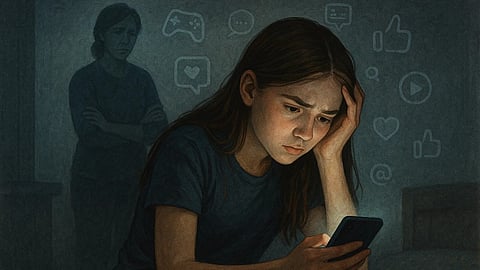Context: Adolescent Mobile Use, Behavioral Patterns, and Risks
The violent outcome of this dispute brings to light broader concerns about adolescent engagement with mobile devices, including excessive use, dependency, and psychological effects. In Kerala, between 2023 and end-2024, over 15,000 children were reported to have received treatment at mental health services for problems associated with excessive mobile phone use, with issues such as depression, anxiety, high stress, and academic decline cited among cases. The state’s Department of Women and Child Development, district resource centres, and school counselling networks have documented that such excessive usage can carry mental and physical consequences.
Several studies and reviews have characterised links between problematic mobile or game use and negative mental health outcomes in adolescents and young adults:
A study on mobile game addiction found positive associations with social anxiety, depression, and feelings of loneliness among users.1
Internet Gaming Disorder (IGD) - recognised as a behavioural disorder under the World Health Organization’s ICD classification is defined as persistent, recurrent use of internet games leading to clinically significant impairment or distress.3
In a qualitative analysis of adolescent gamers, participants described emotional withdrawal symptoms (e.g. irritability, mood changes) when unable to game, and emphasized loss of time, social conflict, and decline in other life activities.3
Among female adolescent gamers, studies have reported associations between problematic gaming and emotional or behavioral difficulties (e.g. difficulties in regulation, anxiety, depression) though data remain more limited compared to male populations.4
In Kerala specifically, among medical students in Central Kerala, a study using the IGDT-10 tool found approximately 6.98 % showed patterns of problematic gaming. These individuals were more likely to report headaches, neck pain, wrist pain, and other physical complaints. 2
These findings suggest that heavy engagement with mobile games or devices may contribute to psychosocial stress, irritability, withdrawal symptoms, and conflict in interpersonal relationships.
Mechanistically, repeated exposure to rewarding elements, notifications, in-app reinforcements, and persuasive design features in apps may promote habit formation and compulsive checking behaviour. Over time, this can reduce self-regulation capacity, increase impulsivity, and impair coping under stress.


